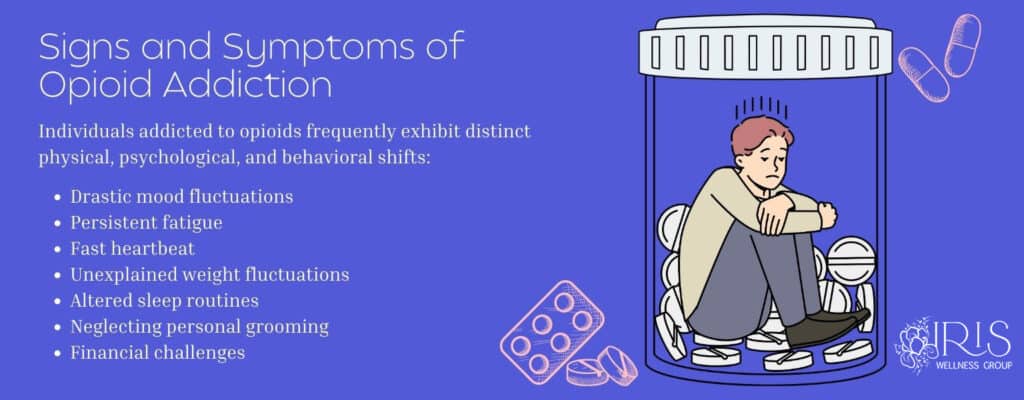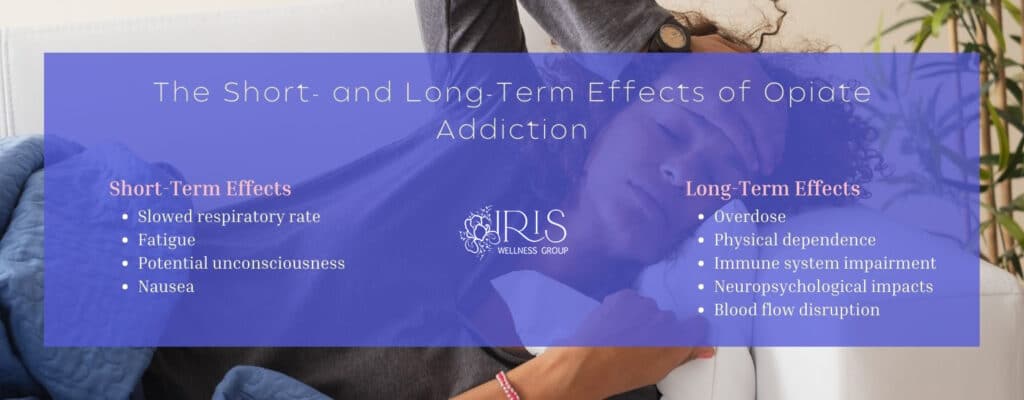Table of Contents

The 2021 data from the Tennessee Department of Mental Health and Substance Abuse shed light on a concerning situation. Approximately 3.9% of Tennessee’s adult population, which is a staggering 212,200 individuals aged 18 and above, are contending with Opioid Use Disorder (OUD). But it’s not just the adults who are affected. The data reveals that the tendrils of the opioid crisis have reached the younger generation as well. About 0.5% of youths between the ages of 12-17, amounting to 7,980 individuals, are also struggling with Opioid Use Disorder. These numbers emphasize the crucial need for community awareness, early intervention, and supportive treatment options to help those affected. If you or a loved on are struggling with opioid addiction, Iris Wellness Group is here to help. Call our opioid rehab in Chattanooga, TN to begin your opioid treatment.
What Are Opioids?
Opioids have frequently made headlines in recent years, especially with the rising concerns over the opioid epidemic. These powerful drugs play a dual role: while they are crucial in medical settings for pain management, their potential for abuse and addiction has led to widespread challenges. So, what exactly are opioids?
Opioids are a class of drugs known primarily for their pain-relieving properties. They work by interacting with opioid receptors on nerve cells in the body and brain. This interaction can relieve pain and produce feelings of pleasure, making them effective for pain management but also prone to misuse.
Opioids can be classified into three main categories:
- Natural Opiates: Derived directly from the resin of the poppy plant, these include morphine and codeine. Historically, they’ve been used for pain relief and recreational purposes for centuries.
- Semi–synthetic Opioids: Created in labs from natural opiates, drugs like heroin, oxycodone, roxicodone, and hydrocodone fall into this category. They maintain potent pain-relieving properties, often with heightened risks of addiction.
- Synthetic Opioids: Entirely man-made, these drugs include methadone, fentanyl, and tramadol. They are crafted to mimic the pain-relieving properties of natural opiates but can vary greatly in strength, with some, like fentanyl, being exceptionally potent.
In medical settings, opioids play an invaluable role. They help patients manage acute pain after surgeries, chronic pain from conditions like cancer, and other forms of severe pain that don’t respond to over-the-counter pain relievers. Additionally, some opioids help in treating coughs and diarrhea.
However, due to the pleasurable feelings and euphoria they can induce, prolonged use can lead to physical dependence. Over time, users might require higher doses to achieve the same effects, escalating the risk of overdose.
The dark side of opioids has become increasingly evident with the onset of the opioid epidemic. This crisis is characterized by increased opioid prescriptions, rising opioid use disorder, and a surge in overdose deaths. The addictive nature of opioids, combined with their easy availability, has contributed to this widespread problem. If you or your loved one are struggling with opioid addiction, call Iris Wellness Group today to begin your opioid addiction treatment Chattanooga.
About Our Opioid Rehab in Chattanooga
At Iris Wellness Group in Chattanooga, TN, we recognize the complexities of opioid addiction and offer a comprehensive approach to opioid use disorder. Our opioid rehab in Chattanooga, TN, provides a realistic environment for individuals grappling with addiction, ensuring they’re not just treated but prepared for real-world challenges.
Many individuals complete a standard 30-day treatment program only to find themselves without the necessary structure and support upon discharge. This lack can often pave the way for relapse. However, at our opioid rehab in Chattanooga, we prioritize tailored plans that cater to an individual’s unique situation and needs.
Clients initially engage in our intensive day treatment program. As they progress, there’s a transition to a less intensive level of care. This flexibility allows them to pursue employment or education while simultaneously undergoing treatment. They can choose to reside in a sober living facility or stay in their homes, but throughout this process, they are never without the support of our dedicated treatment team. This balance ensures they face real-life challenges while benefiting from continuous guidance and structure.
Recognizing the role families play in recovery, we incorporate family therapy, believing in healing the entire familial system. Our holistic approach to treatment means clients receive not just therapy but a range of services to set them up for long-term success. Our therapies include:
- Medication-Assisted Treatment, including Vivitrol
- Nutritional counseling
- Setting short-term and long-term objectives
- Guidance in securing employment
- Financial planning and money management advice
- Structured accountability measures
- Individual Therapy
- Group and Family therapy sessions
- Assistance with personal and home organization
- Sober companion services
- Recovery coaching
Our multifaceted approach ensures that those battling opioid addiction in Chattanooga have the resources and support to pave a sustainable path to long-term recovery.

Signs and Symptoms of an Opioid Addiction
Those prescribed opioids for pain management should adhere strictly to their physician’s guidelines to prevent misuse. Misusing these drugs can lead to addiction, where the individual might prioritize obtaining the drug over other essential aspects of life, thereby straining personal and professional ties.
It’s essential to understand that anyone can become physically reliant on opioids. Initial signs of this dependency can manifest as withdrawal symptoms, like intense cravings or excessive sweating. Interestingly, while some may misuse opioids without showing signs of physical dependence, others are more prone to developing opioid use disorder. The exact reasons for these variances remain unclear.
Opioid use disorder, sometimes referred to as opioid addiction, can trigger a combination of behavioral, physical, and mental health issues. Some potential indicators of opioid use disorder include:
- Diminished interest in activities once enjoyed
- Drastic mood fluctuations
- Challenges in work or academic settings
- Persistent fatigue
- Unexplained weight fluctuations
- Altered sleep routines
- Neglecting personal grooming
- Financial challenges
- Withdrawing from social circles
It’s crucial to note that these signs could point towards opioid use disorder or other underlying mental health conditions. If you observe unexpected and significant behavioral changes in someone close to you, it’s advisable to consult a reputable health care expert. Professionals like family doctors, psychiatrists, or therapists can help discern if these changes stem from psychological or medical roots and can suggest opioid addiction treatments if required.
What Causes an Opioid Addiction?
In the U.S., around 3 million individuals grapple with opioid addiction, stemming from either illicit sources or prescribed medications. While anyone consuming opioids is susceptible to addiction, it remains uncertain why some people are more inclined to develop substance use disorder than others. The interplay of genetic, psychological, and environmental factors can amplify this risk:
Modifying Opioid Consumption
When opioids are consumed in ways other than their prescribed method, their addictive potential heightens. Some individuals, seeking an intensified high, might crush, snort, or inject the medication, particularly perilous with prolonged or extended-release formulations. Such actions can trigger “dose dumping” – a rapid release of the drug, elevating overdose risks. Moreover, consuming opioids beyond the recommended dose or duration augments addiction chances.
Personal Historical Factors
Your background can profoundly influence addiction susceptibility. Factors like youthfulness or past legal issues, such as DUIs, may raise the propensity for substance use disorder. Young individuals, especially teens, may have a heightened curiosity about drugs, often influenced by their peers or popular culture. Also, previous instances of substance rehabilitation or heavy tobacco consumption can pave the way for opioid addiction. Risk-takers might unknowingly spiral into addiction while chasing exhilarating highs through opioids.
Psychological Elements
Individuals with histories of profound depression or anxiety might seek solace in opioids. Research indicates that mental health disorders and substance use disorder often coexist. Common co-occurring conditions include:
- Generalized anxiety disorder
- PTSD
- Thought Disorders
- Depression
- Bipolar Disorder
- ADHD
- Borderline or antisocial personality disorders
Early drug initiation often manifests during adolescence, a phase marked by significant life transitions. Absence of guidance during these tumultuous times can push them towards substance reliance.
Environmental Influences
Environmental triggers, such as familial deaths or job losses, can compel individuals towards opioids. These events cause stress hormone releases, potentially altering genetic configurations. Notably, these hormones can impact the brain’s reward mechanism, a system closely tied with addiction onset and stress-induced relapses during recovery.
Additionally, factors like economic hardships, exposure to high-risk environments or individuals, and experiencing prolonged pain or injuries can also foster addiction tendencies at any life stage.

What are the Short- and Long-Term Effects of Opiate Addiction
Opioid use disorder has become a pervasive issue, affecting not only those who suffer from addiction but also their families and friends. Often, the signs aren’t immediately recognizable, leaving loved ones grappling to understand and assist those ensnared by the addiction.
The danger of opioid addiction lurks regardless of whether they’re prescribed for short or extended durations. As individuals grow accustomed to opioids in their system, they may escalate doses to achieve the same effect, increasing potential harm. Here are some consequences of this addiction:
Short-term effects of opioid addiction include:
- Slowed respiratory rate
- Fatigue
- Potential unconsciousness
- Nausea
Combining opioids with other substances, such as depressants or alcohol, can intensify these effects, especially if misuse becomes habitual.
Long-term effects of sustained opioid use disorder are:
- Overdose risk: The enduring abuse of opioids magnifies the risk of a lethal overdose.
- Heightened tolerance: Regardless of the specific opioid consumed, users will invariably need escalating doses as tolerance builds.
- Physical dependence: Opioids induce a euphoric sensation in nerve cells. When this is withdrawn, severe symptoms like bone and muscle pain, “cold turkey” chills, diarrhea, vomiting, insomnia, and mood disturbances can manifest.
- Immune system impairment: Chronic opioid misuse can render users more susceptible to infections.
- Increased vulnerability to HIV and hepatitis: Especially if opioids are taken intravenously.
- Neuropsychological impacts: The dual effect of brain structure alterations and escalating opioid requirement can lead to profound psychological consequences.
- Blood flow disruption: Opioids can obstruct blood vessels or lead to vein collapse, triggering grave health concerns.
- Choking hazard: A frequent and perilous side effect, which can be a precursor to overdose.
If opioid addiction affects you or someone close to you, don’t hesitate to reach out to our opioid addiction treatment center in Chattanooga, TN at 423-564-6114.
Opioid Withdrawal
Opioid withdrawal can be a tough process that kicks in when someone stops using opioids after using them regularly for a while. The severity and length of opioid withdrawal symptoms can really vary, depending on a few things:
- The kind of opioid you’ve been using (like heroin, Percocet, Vicodin, OxyContin)
- How much and how often you’ve been taking it
- How long you’ve been using opioids
- Your overall health and how fast your body processes things
The timeline for these symptoms depends on whether you’re using short- or long-acting opioids:
- Short-acting opioids: For drugs like heroin, Percocet, and Vicodin, withdrawal symptoms can start about 12 hours after your last dose. They usually hit their peak within 24 to 48 hours and can last around five days.
- Long-acting opioids: For meds like OxyContin, withdrawal might not begin until 30 hours after the last dose and could stick around for up to 10 days.
Common symptoms for opioid withdrawal include:
- Lots of yawning and a runny nose
- Heavy sweating and tearing up
- Feeling agitated and restless
- Muscle aches and discomfort
- Trouble sleeping or insomnia
- A fast heartbeat and high blood pressure
- Fever and sometimes chills
Given how intense and uncomfortable withdrawal can be, many people choose to go through the process with medical supervision. Trying to detox on your own can be tough and risky, especially since severe symptoms or strong cravings might lead to a relapse. In a detox center or treatment facility, medical staff can help make the withdrawal smoother and less upsetting. This approach is not only safer but also lays a good foundation for the next steps in your recovery journey.
Opioid Overdose
Opioid overdoses are a major health concern, mainly due to their serious impact on how the brain controls breathing. In an overdose situation, the respiratory system can be so severely affected that it becomes a life-threatening emergency. It’s crucial to recognize the signs of an opioid overdose quickly and accurately:
- Pinpoint Pupils: A key sign of an opioid overdose is extremely small pupils, often referred to as ‘pinpoint’ pupils. This is caused by the way opioids affect the nervous system.
- Unconsciousness: Someone experiencing an opioid overdose might become unresponsive. This can vary from a deep, sleep-like state where it’s hard to wake them up, to a state of complete unconsciousness where they don’t react to anything around them.
- Breathing Problems: Opioids can dramatically slow down or even stop breathing. This might look like very shallow or irregular breathing, and in serious cases, the person might stop breathing altogether.
Recognizing these symptoms is vital for a quick response. If you think someone is having an opioid overdose, you need to act fast by calling emergency services and using naloxone if you have it. Knowing about the dangers and signs of opioid overdose is an important step in reducing its frequency and severity.
Types of Treatment Available for Opiate Addiction in Chattanooga, TN
Individual needs and the intensity of care vary when it comes to treating opioid addiction. Treatment options range from hospital settings, residing in specialized centers, or receiving care while continuing to live at home:
- Residential Treatment: Within this setup, patients reside alongside others on the journey to overcoming opioid addiction. Such centers provide nourishing meals, a serene resting environment, and often amenities like gyms or wellness classes. These facilities emphasize group support, and participants typically engage in regular group sessions. Simultaneously, personal therapy sessions delve into the psychological facets intertwined with addiction.
- Outpatient Programs or Intensive Outpatient Programs (IOP): Distinct from in-residence therapy, outpatient treatment grants individuals the flexibility to manage daily responsibilities like work or childcare, while simultaneously addressing their addiction. This mode can either supplement post-residential treatment to bolster recovery prospects or stand as the principal therapy method, especially for those juggling other commitments. For budget-conscious individuals, outpatient care might prove more economical compared to inpatient or hospital-centric options.
- Partial Hospitalization Programs: These in-patient or semi-hospitalization plans merge the facets of addiction treatment with essential medical services, catering to those grappling with health complications. Drawing parallels with residential setups, hospital regimes may encompass medications, counseling, behavioral therapies, and a rigorous, structured regimen to usher patients toward sobriety.
- Counseling: Both group sessions and one-on-one counseling can pave the way for reshaping perceptions and behaviors tied to opioid consumption. Such sessions shine a light on the interplay between mental health and addiction, while also cultivating positive habits to embrace post-treatment. Engaging in group counseling fosters a sense of solidarity, given the shared experiences of participants.
- Medication: Specific drugs can mitigate the withdrawal symptoms that emerge during opioid detoxification. Whether in an inpatient or outpatient setting or within a hospital, these medications facilitate a smoother transition from dependency, ensuring the recovery journey is more manageable.
Start Your Opioid Treatment Today!
The Benefits of Opioid Treatment Chattanooga
Opioid use disorder, a debilitating condition affecting countless individuals, has left a significant mark on communities worldwide. But amid this crisis, opioid addiction treatment emerges as a beacon of hope, offering a path to reclaim lives and rebuild futures. Let’s explore the transformative benefits of undergoing opioid rehab in Chattanooga.
- Physical Health Restoration: Chronic opioid use can deteriorate one’s physical health, leading to myriad complications. The initial stages of opioid treatment involve medically supervised detoxification, ensuring a safe and more comfortable transition as the body rids itself of toxins. With consistent treatment, patients often experience improved sleep, enhanced energy levels, and an overall boost in physical well-being.
- Mental and Emotional Recovery: Opioid use disorder often intertwines with mental health challenges. Opioid rehab centers provide therapeutic sessions addressing the psychological aspects of addiction. Through individual and group counseling, patients confront underlying traumas, learn coping mechanisms, and build resilience against relapse.
- Skill Acquisition: Opioid addiction treatment isn’t limited to addressing the immediate issues of substance abuse. These programs instill essential life skills, helping patients navigate daily challenges, manage stress, and make informed decisions without resorting to substance use.
- Strengthened Relationships: Opioid dependency strains personal relationships. Many treatment programs incorporate family counseling, emphasizing the repair and rejuvenation of bonds. By fostering understanding and open communication, opioid rehab paves the way for supportive, lasting relationships essential for recovery.
- Societal Reintegration: Addiction can often lead to social isolation, legal troubles, or job losses. Opioid addiction treatment centers recognize this and often include vocational training or job placement assistance. By providing these resources, rehab centers ensure that individuals are equipped to reintegrate into society and lead fulfilling lives.
- Community and Peer Support: One of the most profound benefits of opioid rehab is the sense of belonging. Patients connect with others on similar recovery journeys, cultivating a supportive community that understands their challenges and celebrates their successes.
- Aftercare and Continued Guidance: Recovery is a lifelong commitment. Many opioid treatment facilities offer aftercare services, ensuring that patients have access to continued support, resources, and guidance as they navigate their post-rehab lives.
Opioid treatment is a comprehensive approach to healing, addressing not just the physical manifestations of opioid use disorder but its broader impacts. At Iris Wellness Group, we offer expert opioid rehab in Chattanooga, TN, designed specifically for adults and teenagers facing this challenge.
How long is Opioid Treatment?
The length of opioid addiction treatment in Chattanooga varies for each individual, depending on their specific needs and situation. Here’s what you might expect during the treatment process:
- Detox Phase: The journey typically begins with detoxification, a critical phase that generally lasts between three to seven days. This step is essential for safely managing withdrawal symptoms under medical supervision, ensuring a safe and controlled start to the recovery process.
- Residential Inpatient Care: After detox, many individuals move into residential inpatient treatment. This phase can last from a few weeks to up to 90 days, depending on factors like the severity of the addiction and the individual’s progress. Residential care provides a structured environment focused on recovery.
- Outpatient Care: Following inpatient treatment, outpatient care often becomes the next step. This phase offers greater flexibility, allowing individuals to continue their recovery while returning to their daily activities. Outpatient treatment is crucial for reinforcing sobriety principles and offers ongoing support as individuals adapt to everyday life.
- Long–Term Support: Recovery from opioid addiction is a continuous journey. Long-term support, which might include mentorships, participation in 12-step programs, or other community support forms, plays a vital role. Even after formal treatment phases, having access to a reliable support network is essential. This support can vary in form, ranging from regular meetings to having a trusted mentor or support group available during challenging times.
Recovery from opioid addiction is a deeply personal and lifelong journey. The importance of ongoing support extends beyond the end of formal treatment. Maintaining connections with a support system is invaluable for sustaining long-term sobriety and effectively navigating the ups and downs of recovery in Chattanooga.
Does Insurance Cover Opioid Addiction Treatment?
Yes, plenty of opioid treatment centers accept various forms of in-state and out-of-state insurance plans. To find out whether or not your insurance will cover the full or partial cost of your opioid treatment, simply provide your insurance information on our verify insurance form and an Iris Wellness Group admissions representative will inquire on your benefits or call us now at 423-564-6114.
Begin Opioid Treatment in Chattanooga, TN
Opioid use disorder can be effectively treated, and with the right professional assistance, a lasting recovery is within reach. At Iris Wellness Group, we provide specialized opioid treatment in Chattanooga, Tennessee, tailored for both adults and adolescents grappling with this condition. To embark on your healing journey, contact us or explore our admissions page.
Opioid Addiction Frequently Asked Questions
What Is Opioid Addiction?
Opioid addiction is a chronic medical condition characterized by the compulsive use of opioids despite harmful consequences. It involves changes in the brain that lead to powerful cravings, withdrawal symptoms, and impaired control over opioid use. This addiction can develop from the misuse of prescribed opioid medication or from using illegal opioids like heroin.
Are Opioids Addictive?
Yes, opioids are highly addictive. Their ability to produce significant pain relief and euphoria makes them susceptible to misuse, leading to addiction. Even when used as prescribed, there is a risk of developing dependence and addiction.
Why Are Opioids Addictive?
Opioids are addictive because they bind to and activate opioid receptors in the brain, releasing high levels of dopamine and creating feelings of pleasure and euphoria. This response can reinforce the act of taking the drug, leading to repeated use and addiction.
What Is Opioid Abuse?
Opioid abuse refers to the misuse of prescription opioids or the use of illegal opioids like heroin. This includes taking opioids in a way not prescribed, such as taking higher doses, using them more frequently, or using them for their euphoric effects rather than for pain relief.
What Is the Difference Between Opiates and Opioids?
Opiates are natural substances derived from the opium poppy plant, like morphine and codeine. Opioids, a broader category, include opiates and also synthetic or semi-synthetic drugs like oxycodone, hydrocodone, and fentanyl, which are chemically similar and act on the same brain receptors.
How Long Do Opioids Stay in Your System?
The duration opioids stay in the system varies depending on the type of opioid, dosage, and individual metabolism. Generally, they can be detected in urine for 1-3 days, in blood for up to 24 hours, and in hair for up to 90 days.
What Drugs Are Opioids?
Opioids include a range of drugs, both legal and illegal. Prescription opioids include oxycodone, hydrocodone, morphine, and fentanyl, while heroin is an illegal opioid. All these drugs have a high potential for addiction.
Why Can an Opioid Overdose Cause Death?
An opioid overdose can cause death primarily due to respiratory depression. Opioids affect the brain’s areas that control breathing. In high doses, they can significantly slow down or even stop breathing, leading to hypoxia (insufficient oxygen reaching the brain), which can result in coma, permanent brain damage, or death.
What Are Some Forms of Treatment for Opioid Addiction?
Treatment for opioid addiction includes medication-assisted treatment (MAT) using drugs like methadone, buprenorphine, or naltrexone, combined with behavioral therapies, counseling, and support groups to address both the physical and psychological aspects of addiction.
Who is Chattanooga Opioid Treatment Designed For?
Chattanooga opioid treatment caters to individuals living in Chattanooga, Red Bank, Signal Mountain, Lookout Mountain, Southeastern Tennessee, Northern Georgia, or surrounding areas. These services are ideal for those who do not require medically supervised detoxification, have a stable and supportive home and work environment, and are self-motivated in their journey towards recovery.
How Long Does Opioid Withdrawal Last?
Opioid withdrawal duration varies but typically begins within 12 hours of the last dose and can last for 5-10 days. The most severe symptoms usually peak around 72 hours after the last dose.
Is Outpatient Treatment Effective for Opioid Use Disorder?
Outpatient treatment can be effective for opioid use disorder, particularly for those with less severe addiction, strong support networks, and daily responsibilities they cannot leave. It involves regular therapy sessions while living at home.
What Is the Typical Outpatient Opioid Rehab Program?
A typical outpatient opioid rehab program includes regular visits to a treatment center for therapy, counseling, and sometimes medication-assisted treatment. These programs focus on recovery while allowing patients to maintain their normal daily activities.
How Much Does Opioid Treatment Cost?
The cost of opioid treatment varies widely based on several factors, including the type of treatment, the length of the program, and whether it’s inpatient or outpatient. Outpatient programs can range from minimal cost to several thousand dollars, while inpatient programs can range from about $6,000 to $20,000 for a 30-day program. Medication-assisted treatment (MAT), involving medications like methadone or buprenorphine, can cost between $4,700 and $14,000 per year. It’s important to note that many insurance plans cover some portion of opioid addiction treatment, but coverage details and out-of-pocket expenses can vary. Additionally, some treatment centers offer sliding scale fees based on income or financial assistance programs.









